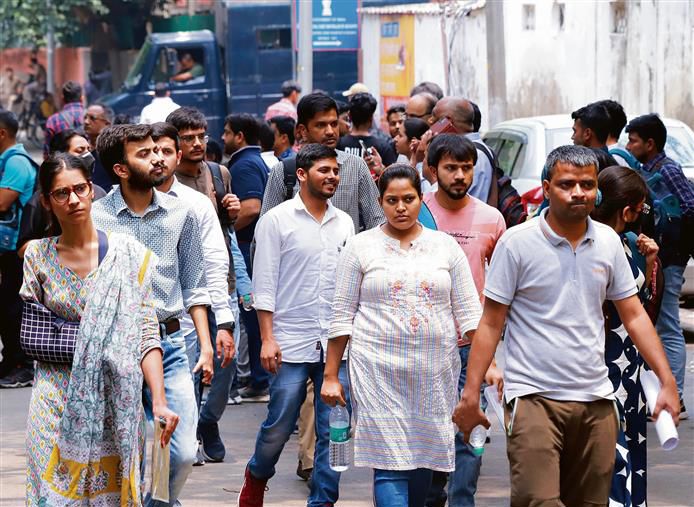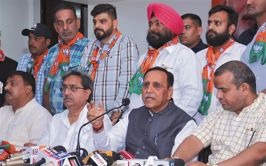
Uphill task: The civil services myth is hypnotising, even though the success ratio is extremely low. Tribune photo
Sociologist
AS the results of the UPSC civil services exam capture the attention of the media and the public, the smiling faces of the IAS ‘toppers’ are seen everywhere — from the billboards in our cities to the front-page ads of branded coaching centres in leading newspapers. Or, for that matter, as the results of exams of various school boards have begun to come, we see yet another process of constructing the images of ‘toppers’ — youngsters with their miraculous performance in physics, chemistry, mathematics and biology!
It is sad that this hyper-competitive ethos of social Darwinism is altering the self-perception of even school students.
I am getting increasingly tired of hearing these success stories; rather, I am interested in understanding the pathology of the system that manufactures ‘failures’ amid the spectacular demonstration of select success stories.
Take, for instance, the lucrative business of India’s
Rs 3,000-crore UPSC coaching industry. Move around the lanes and bylanes of Mukherjee Nagar and Karol Bagh in Delhi; converse with the crowd of young aspirants — engineers, doctors, PhD holders, university students; and feel the power of the dream of ‘success’ through which the celebrity ‘gurus’ of these coaching centres with their notes, lectures, guide books, interview strategies and even motivational speeches trap these aspirants. Well, this dream sells because we live in a society that worships power — not necessarily the power of knowledge and wisdom, but the politico-administrative and economic power. And for innumerable middle-class parents in small towns and villages, it matters a lot if their sons/daughters can manage to become a district collector or a superintendent of police with visible signs of official power, privilege and glamour. This elevates their status and position in the local community. Yes, the UPSC myth is hypnotising. Although the success ratio is extremely low (for instance, in 2023, 13 lakh candidates appeared in the UPSC preliminary exam; eventually, 1,016 were selected), the business goes on. While we worship the success stories, we fail to acknowledge the intensity of psychic and intellectual damage the coaching enterprise causes to those who fail. Imagine the fate of most of these aspirants spending five to six years repeatedly trying to achieve the mythical success, consuming the ‘notes’ of history/geography/sociology/psychology/general studies day and night, investing a huge amount of money, and failing time and again! Yes, this dehumanised and mechanised system finishes them — psychologically and intellectually. For many of them, it becomes exceedingly difficult to overcome this wounded self-esteem, and redefine life with hope and creativity.
Furthermore, the entire system causes severe harm to the fundamental objectives of higher learning. Certainly, it is not a matter of glory if an engineering graduate from IIT-Kanpur or a MBBS doctor from AIIMS, New Delhi, becomes a police officer or an income tax commissioner. Likewise, if a student of history from a leading university misses his classes regularly, forgets the likes of Eric Hobsbawm and Irfan Habib, and concentrates primarily on the ‘notes’ or ‘success manuals’ supplied by coaching centre strategists (yes, many of them have millions of YouTube subscribers), it indicates the intensity of the damage the coaching enterprise is causing to the growth of innovative teaching and research in our universities. Have we forgotten that a vibrant nation needs great physicists, political philosophers, social scientists and literary critics — not just a bunch of district collectors and police commissioners?
It is sad that this sort of hyper-competitive ethos of social Darwinism is altering the self-perception of even school students. See the way the images of the ‘toppers’ of board exams, or standardised tests like JEE and NEET are constructed — the way these girls and boys are transformed into instant ‘stars’ and led to believe that they are ‘special’. Again, with this sort of glorification of ‘success’, we tend to forget the intensity of pain and humiliation that wounds the mental landscape of thousands of youngsters who have ‘failed’. When will we understand that not everything is fine with our school education? When will we realise that schools with their regimentation, technologies of surveillance and one-dimensional/exam-centric/bookish learning often alienate those who are imaginative and ‘mad’ enough to strive for something more exciting than what schools can offer? Possibly, they are endowed with the kind of aptitude and skills that do not fit well into the parameters of the typical official curriculum. In their path-breaking studies, educationists like John Holt (How Children Fail) and Kirsten Olson (Wounded by School) have reminded us of the devastating consequences of an educational approach that values conformity over creativity, flattens students’ interests and dampens down differences among learners. Indeed, here is a system that tends to shame, disable and bore many learners.
For many of these vulnerable young minds, it is not easy to overcome the stigma of ‘failure’. It is sad that we fail to tap their creative potential. A sense of fatigue, boredom and loneliness tends to diminish their zeal for a creative and meaningful living. But then, in this ‘success-obsessed’ world, who bothers to understand their pain? Meanwhile, our ‘successful’ youngsters love to become conformists; no wonder it is exceedingly difficult for them to see their life trajectories beyond ‘safe’ and ‘secure’ careers — techno-managers working day and night for the expansion of the neoliberal market, or administrators/bureaucrats saying ‘yes’ to a mode of governance that retains the status quo. Meanwhile, from Kota in Rajasthan to Mukherjee Nagar in Delhi, the coaching factories expand their lucrative business, sell the dream of ‘success’, seduce the anxiety-ridden middle class and destroy the creative rebelliousness of young minds.
Join Whatsapp Channel of The Tribune for latest updates.




























